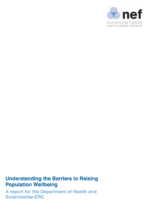Understanding the Barriers to Raising Population Wellbeing
A report for the Department of Health and Sciencewise-ERC
14 September 2011
This report provides details of research that was conducted for the Department of Health and Sciencewise-ERC, involving a public dialogue exercise designed to explore the barriers that people experience to increasing their engagement with activities thought to enhance subjective wellbeing.
Background
- Recent developments in UK mental health policy have emphasised the need for an approach to mental health based on promotion and prevention.
- These arguments were bolstered by the findings of the Foresight Project on Mental Capital and Wellbeing (MCW), a state-of-the-science review for the Government Office for Science.
- As part of the project, nef (the new economics foundation) developed Five Ways to Wellbeing,1 a set of simple, evidence-based public health messages about the kinds of activities that promote positive mental health: Connect, Be Active, Take Notice, Keep Learning, Give.
The research
The Department of Health, in collaboration with Sciencewise-ERC, commissioned nef to undertake a public dialogue exercise, with the aim of exploring three questions:
- To what extent do people feel able to make the kinds of discretionary changes in their lives that (evidence suggests) would lead to increased subjective wellbeing?
- What, if any, are the structural or systemic barriers that prevent people engaging in activities that would improve their wellbeing?
- How might people react to messages that use concepts and words of wellbeing and positive mental health, and what should messages be like, who should they be from and should they use science?
A series of structured dialogue events was held in six locations around the country, covering a range of age, ethnic and socio-economic groups. The Five Ways to Wellbeing were used as a way to frame the discussion.
Results
Barriers: For some people there was no evidence of significant barriers to engaging in Five Ways-type activities; these people typically felt confident in their ability to change their behaviours as they wished, in control of their lives, or manifestly engaged in a high level of Five Ways-type activity already.
For others, however, there was evidence of experienced barriers. These can usefully be divided into three categories:
- External barriers. For some people, barriers to Five Ways-type activity were principally a consequence of factors external to them, and herelack of time and money, lack of available facilities/opportunities and major life events were salient.
- Internal barriers. Some people indicated that the major barriers they experienced to Five Ways-type activity were psychological in nature, such as depression or a strong sense of incapacity.
- Psycho-social barriers. Most of the barriers reported fall some way in between the external and internal realms, being a function of how the individual interacts with their social environment; for some people, engaging in (some) Five Ways-type activities does not occur to them; for some, finding an enjoyable, relevant form of activity proves difficult; for some, motivation to do relevant things is missing; for some habitual patterns of behaviour crowd out engagement in Five Ways-type activities.Some people clearly feel a lack of control in their lives and this in turn may imply the lack of a felt ability to initiate behaviour change. Some feel – and reflect explicitly on the way in which – group, cultural or social norms dictate which behaviours are inside and outside their frame of reference or lived world. Some people appear to feel that they are somehow not entitled to initiate relevant activities, and for some, communication technologies are experienced as a barrier to particular Five Ways activity.For some people, pre-existing groups – a key means of engaging with a number of Five Ways-type activities – are exclusive and isolating, and in any case there appears to be a lack of non-exclusive, structured groups (family and community) available.
Underpinning many of these barriers is the lack of a felt sense of agency. This emerges as a key issue preventing people from making lifestyle changes to improve their wellbeing. In addition, some of the most significant barriers relate to social norms and expectations rather than to ‘hard’ barriers of time and money.
Messaging: The public’s responses to the term wellbeing are extremely mixed. Some feel that it is impenetrable and too abstract; some equate it with ‘feel-good’ products and services (skincare, aromatherapy); some link it to mental health problems. The Five Ways to Wellbeing themselves can be interpreted and experienced negatively as well as positively.
Rather than being motivating, framing wellbeing as a scientific issue seems to be unnecessary and even unwelcome for many people. Common sense or personal experience is more convincing than the science.
Next steps
Analysis of the findings suggests a number of areas for future research and policy development. In terms of communication, the research suggests that attempts to reach the public through social marketing should:
- Ensure that messages do not appear to come from ‘the Government’
- Use concrete messaging that suggests particular activities or actions
- Avoid framing messages as ‘scientific’.
The objective of communication should go beyond merely providing information about wellbeing and the Five Ways and should instead:
- Work to create a new common language for positive mental health, in a way that makes it seem desirable and attainable
- Raise awareness of opportunities for engaging in wellbeing activities
- Focus on increasing people’s felt sense of agency.
Findings from the research are relevant for ongoing work in a number of areas of policy, including the public health and health improvement agendas, mental health, substance misuse and older people. A process of stakeholder policy engagement is currently underway in order to explore the implications of the findings for ongoing policy and strategy development.
Topics Wellbeing







